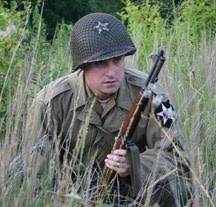 |
| Stationed on the plains of western Nebraska... September, 1943. |
The 507th Parachute Infantry Regiment (PIR) was activated on July 20, 1942 at Fort Benning, Georgia. Lieutenant Colonel George V. Millett Jr. was given command of the regiment. After jump-training at Fort Benning the regiment deployed to the Army Air Base at Alliance, Nebraska and became part of the 1st Airborne Brigade. The 507th was stationed at Alliance from March through October 1943 making demonstration jumps at Denver, Omaha and the Black Hills of South Dakota. The 507th shipped out in November and arrived in North Ireland in December, 1943. As part of the 2nd Airborne Infantry Brigade, the 507th was assigned to the 82d Airborne Division to replace the 504th Parachute Infantry regiment that had suffered many casualties in Italy. The 507th moved to Nottingham, England in March, 1944 to prepare for the Allied invasion of Europe. Their D-Day objective was to help secure the Merderet River crossings. Although their target was supposed to be in Drop Zone T, north of Amfreville, the confusion caused by clouds and flak resulted in a wide scattering of the unit. Men from the 507th fought with distinction in several crucial engagements including battles at Graignes, Chef-Du-Pont and La Fière. Noted military historian S.L.A. Marshall called the battle at La Fière "probably the bloodiest small-unit struggle in the experience of American arms." After returning to England, the 507th was permanently assigned to the 17th Airborne Division, because another of the 82nd's regiments, the 504th, had returned by then from Anzio. As part of the 17th, the 507th was not utilized in Operation Market Garden and was still in England training with the new division when the Battle of the Bulge began. The unit redeployed to France on 25 December 1944, and was used in the counter-attacks against the Germans in January and early February 1945. Finally, the regiment dropped near Wesel, Germany on 24 March to spearhead the division's assault during Operation Varsity.
This is a pretty straightforward uniform this month with no flashy weapons or equipment. I pulled together the cap patch, jump wing oval and the Airborne Command patch over the past few weeks. And I purchased my own pair of authentic brown Corcoran jump boots. They're still going to take some time to break-in, but they're so worth it. This was a fun and quick uniform to put together. I plan on doing at least two more 507th PIR uniforms in the coming year - a field training uniform from their time at Alliance and a D-Day combat uniform.
 |
| Sunset was a great time to take these photos. This is a pretty sharp-looking uniform if I do say so myself. |
 |
| Close-up view of the Airborne cap patch. This is the darker blue version, just one of many variants. |
 |
| The 507th's jump wing oval was black with an orange border. Each Airborne regiment had its own color scheme. |
 |
| Here are a pair of the highly prized Corcoran jump boots. I can foresee hours of boot shining in my future! |
 |
| Another shot of the full uniform at sunset. Airborne all the Way!!! |
 |
| Company H of the 507th PIR at Alliance Army Air Base. Note the 507th's "Jumping Spider" mascot in the back. |











3 comments:
May I ask: How in the world do you get that color phasing on your boots, from black/very dark brown to lighter brown (shown on image 5)? What brand and color of shoe polish did you use? Did you spit shine the shoe anywhere other than the toe cap?
-Adrian
It's actually just the sunlight hitting the boots just right. This photo was shot right as the sun was going down so the lower part of my boots is in shadow while the upper half is still receiving direct sunlight. I just used Kiwi Brown Shoe Polish on them.
Post a Comment